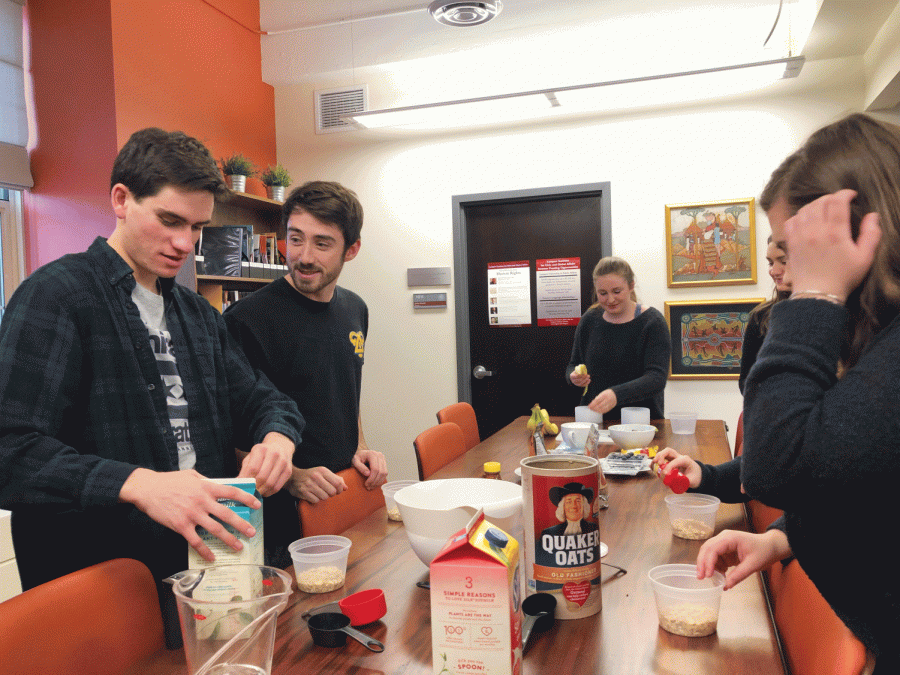The Recipe for a More Sustainable Diet
As part of the Colgate University Office of Sustainability’s “Sust is a Must” series, this week’s featured event focused on encouraging sustainable cooking. This series helps students earn one hour towards their P.E. credit as part of the Wellness Passport program at Colgate. Additionally, the Office of Sustainability works to “create long-term economic resiliency, build and restore robust ecological systems, and support a healthier and more just society,” as stated in the 2014 Sustainability Strategic Plan. What better way to learn and implement sustainable practices than by making delicious overnight oats with committed students and peers?
The cooking class helped students learn about the intersections of sustainability and food practices. Students got their hands dirty in the kitchen as they were taught how to reduce their carbon footprint by lowering meat and dairy consumption in a delicious way. It began with a lecture by three Office of Sustainability Interns discussing the three pillars of sustainability: social, economic and environmental sustainability. This session focused specifically on environmental and intellectual dimensions of wellness.
A key issue of food consumption is agriculture resource use; animal-based foods are more resource-intensive than plant-based foods – beef specifically uses greater resources than any other human produced food product. The interns stressed that our diet as human food consumers can seriously impact and influence climate change, which will influence agricultural resources in the future. As much as 40 percent of all harvested food in the United States is wasted (U.S Environmental Protection Agency). The preferred method to limit food waste is to reduce food consumption (i.e., only take what you can eat), followed by feeding the hungry, feeding animals with food waste, food waste in industrial kitchens, land composting and lastly, placing uneaten food in landfills as waste.
The next section of the lecture featured a video discussing the benefits and challenges of sourcing local food at Colgate University. Central NY is widely known for its agricultural production; however, outside of dairy products, Colgate fails to source food locally. Increasing local food consumption would facilitate and encourage economic development in Hamilton. In addition, eating locally reduces global deforestation and also causes reductions in greenhouse gas emissions associated with transportation of foods that are not sourced locally.
The Sustainability Interns offered a plan for a more sustainable diet that includes prioritizing plant-based diets, minimizing meat consumption, sourcing locally for food and eating mindfully. Sophomore Sustainability Intern Cecilia Kane offered her advice for students aiming to be more sustainable on campus.
“Minimize meat consumption, especially red meat. Awareness and mindfulness to what you are eating is the first step. Because meat production involves great quantities of water and resources to raise agriculture, reducing red meat consumption is the way to go,” she said.
The ingredients for the overnight oats they made during the session are as follows:
1/3 to 1/2 cup soy milk
1/3 to 1/2 cup old-fashioned rolled oats
1 teaspoon chia seeds (optional)
1/2 banana, mashed (optional)
Add fruit, nuts, chocolate chips and honey to taste!
For future events hosted by the Office of Sustainability, visit http://www.colgate.edu/distinctly-colgate/sustainability.
Contact Caylea Barone at [email protected].
Caylea Barone is a senior from LaGrangeville, New York concentrating in environmental studies and art and art history with an emphasis in studio art. She...






